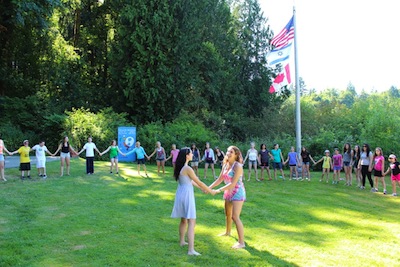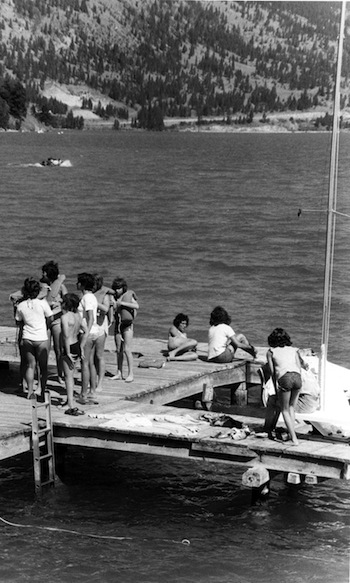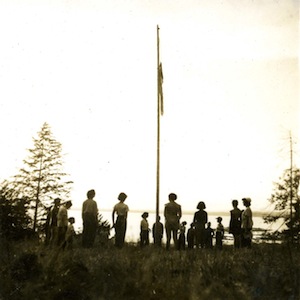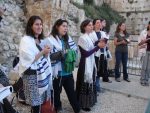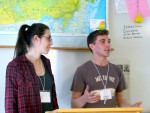Eric Fingerhut, chief executive officer of Hillel International, will be part of FEDtalks on Sept. 13. (photo from Hillel International)
There are internal and external challenges facing the Jewish community, said Eric Fingerhut, and their solutions will come from the young people who are currently on college campuses.
The former U.S. congressman has served since 2013 as chief executive officer of Hillel: The Foundation for Jewish Campus Life and is one of five speakers at FEDtalks, the opening of the Jewish Federation of Greater Vancouver’s annual campaign, which takes place at the Chan Centre next week.
“The one place that the future of the Jewish community actually comes together in a relatively concentrated way for a relatively concentrated period of time is the college campus,” Fingerhut said in a telephone interview with the Jewish Independent. “The question that I want to address with the audience is, how can we use the opportunity of the college years to build a unified Jewish community – not a uniform Jewish community, but a unified Jewish community – that will enable the next generation to make their contribution to the long-term growth of Jewish life, Jewish learning and Israel?”
Finding unity among Jews, particularly around issues of religious and political expression, and in the face of anti-Israel activism that is prevalent on college campuses, is not easy, he acknowledged. Occasional reports emerge claiming that Jewish students are disengaging from the contentious debate around Israel and Palestine, but Fingerhut said confronting these issues is a matter of personal choice and disposition.
“There is no question that, on far too many campuses, there have been contentious debates – and sometimes worse than debates, sometimes really disturbing incidents involving anti-Israel and even antisemitic behaviour,” he said. “For some students, being engaged directly, encountering that kind of behaviour, is something that they feel comfortable doing, that they are inspired to do. But, for others, those kinds of situations are less comfortable and it’s not what they came to college to do. They have many other things on their plate. We don’t judge the level of commitment that a Jewish student has to the Jewish community and Israel by whether or not they show up at a counter-protest or a meeting about BDS. We encourage students to do that, but there are many, many ways for Jewish students to engage with Israel.”
Hillel, he noted, is the biggest recruiter for Birthright, Masa and other Israel experience programs. Hillel also coordinates Jewish Agency shlichim (emissaries) on 75 campuses, young Israelis who engage face-to-face with Jewish and non-Jewish students on North American campuses.
“We provide many, many ways to engage with Israel so that students can build a relationship with Israel, but not necessarily have to do that through being involved in the middle of some of these very ugly protests,” said Fingerhut.
Almost immediately after becoming CEO, Fingerhut was confronted with the development of the Open Hillel movement, a group that rejects Hillel International’s Standards of Partnership for Israel Activities, a policy that outlines the sort of groups with which Hillel will partner. Fingerhut took a firm line and he maintains it.
“Every student, regardless of their opinions or the issues they want to discuss, is welcome,” he said. “Every conversation is welcome. But, as an organization, we are Zionists. We are seeking to support Israel as our Jewish, democratic state. So, while that would certainly involve debate and discussion … it also means that we will not work with organizations whose mission is to hurt the state of Israel, who are trying to undermine the state of Israel. Certainly, that describes organizations that promote BDS.… We’re not going to work with them and we’re not going to host speakers whose career and work have been about trying to undermine Israel and its role as the sovereign representative of the Jewish people. Those are our guidelines and there are some who would want us to change those and we respect them. They have a right to argue for change, to make their case for change. They are welcome as individuals at Hillel, as everybody else [is], even though they disagree with our policies. But we’re not going to change our policies.”
Geopolitics is not the only potentially divisive area for Hillel. Religion is another factor. Building a pluralistic campus community is hard work, he said.
“Hillel is totally committed to Jewish pluralism,” he said. “Hillel’s a place where you’ll see a Friday night service in one room where men and women are praying separately on either side of a mechitzah, the divider. You’ll see another room where men and women are praying together and a woman is leading the service wearing a tallit. You’ll see in another room where maybe a song leader with a guitar is singing and leading music in a different style. You’ll see another room where people are meditating or discussing the issues of the day because prayer isn’t their thing. There may even be a room where people are discussing why they’re not in any of the other rooms.… And then we all come together and we have dinner and we make Kiddush and we celebrate together as a community.”
Respecting this diversity places a unique responsibility on Hillel, he said, and it portends a better future.
“It’s a core value of ours,” he said. “And we believe that, if a student learns to live in a vibrant, pluralistic Jewish community, where we’re not trying to change each other but we treat each other with love and respect, that will hopefully influence how they lead communities as adults when they graduate and go out into the world.”
As the leader of an organization that is almost a century old, one of the things Fingerhut confronts is an outdated perception of what Hillel is.
“Perhaps the number one question I still get asked from folks who remember Hillel from their college days is, how many people go to Hillel?” he said. “That’s just not a question we ask anymore … because our job is to inspire Jewish life on a college campus, and we do that wherever students are. Certainly, some of the activities happen inside a building that is called Hillel. But Hillel is inspiring Jewish life and Jewish activity all across campus, engaging students where they are.”
For example, he said, students sometimes tell him they don’t go to Hillel, but prefer to spend Shabbat with friends in their apartment or dorm.
“And I smile because I know that that was a Hillel-sponsored program,” he said. “We knew that, if the only Shabbos dinner we offered on campus was coming to Hillel, that will attract a certain number of people. But some are going to say, that’s not the way I want to spend Friday nights, going to a large group dinner. So, we knew that, by getting one popular student in a dorm to invite their friends to a smaller group dinner in an apartment building or in a dorm, that would attract additional students.”
As the news doesn’t generally focus on the positive, what doesn’t make headlines are the numbers of Jewish students engaged in a vast range of activities and programs, Fingerhut said.
“People tend to hear the negative, the problems, the anti-Israel activities, the antisemitism,” he said. “They tend not to see the very vibrant Jewish life that exists on so many campuses.”
FEDtalks takes place on Sept. 13 at the Chan Centre. For tickets, visit jewishvancouver.com/fedtalks2017.



